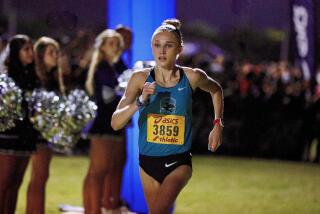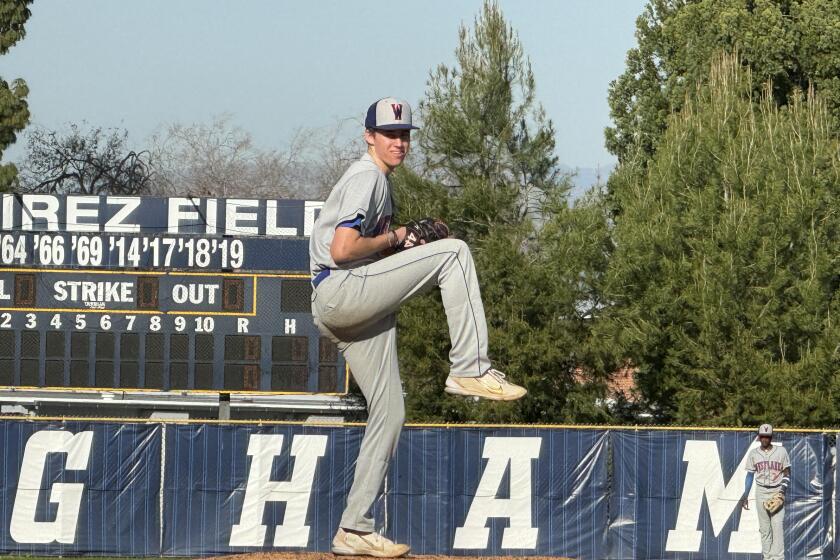In the Long Run, Swedish Track Star Competes to Stay in Shape : Cross-country: For Maria Akraka, running with UC Irvine’s team is preparing her for spring and a shot at an NCAA title at 800 meters.
- Share via
IRVINE — Maria Akraka did not cross the Atlantic to run cross-country.
But when Buffy Rabbitt and the other runners on the UC Irvine women’s team take to the course Saturday in the Stanford Invitational, they will have Akraka, a Swedish half-miler, in their midst.
When spring comes, bringing the NCAA track season with it, Akraka will be among the top performers in the 800 meters and capable of winning the NCAA title.
For now, though she only arrived in Irvine in September and is still weary after a busy summer on the European track circuit, she will compete with the Irvine cross-country team.
Cross-country is a team sport and a season unto itself to the other runners. To Akraka, it is training.
“It will help me to get stronger,” said Akraka, who only began running competitively in 1985 but already has run the 800 in 2 minutes 1.5 seconds and could go to the 1992 Olympics as Sweden’s best half-miler.
She is in Irvine somewhat by happenstance. Akraka ran for Iowa State for two seasons, arriving at that campus on her first visit to the United States on the reference of runners she met in Nigeria. She came to Los Angeles to train last year because of her friendship with Danny Harris, a Californian who is the top-ranked 400-meter hurdler in the world this year, and decided then to enroll at Irvine this fall. She returned to this country on a student visa to study and to train.
Irvine hasn’t sought foreign runners over the years. Of the few who have come, none has done the things Akraka has done.
“We haven’t had anybody with that kind of experience,” said Vince O’Boyle, who coaches the men’s and women’s cross-country teams and the men’s track team.
Akraka, 24, did not pay much attention to her talent until she was a grown woman, visiting her father in Nigeria.
Akraka’s mother, Ingrid, and her father, Smart Akraka, met in England. Three years after Maria and her twin brother, Michael, were born, the family moved to Sweden, her mother’s home. Later, the parents separated, and Smart Akraka returned home to Nigeria.
Maria went to Lagos, Nigeria, to visit him in 1985. Smart Akraka had been a member of the Nigerian 400-meter relay team that competed in the 1960 Olympics in Rome, and is still involved with the national team as a manager.
Maria, like her twin brother and their two younger sisters, always knew she could run fast. Living in Nigeria with her father, she began to cultivate her talent.
“He was very proud in the beginning, even though I wasn’t fast at all,” Maria said in the delicate, lilting accent her background has given her. “When I started doing well, he got real proud.”
In 1986, she ran the 800 in 2:07.30. The next year, she shaved five seconds off that time. In 1988, she ran a 2:01.67. Her best time in 1989 was only 2:03.65, but she ran her personal best of 2:01.50 this summer at Zurich.
Akraka competed in the European Championships, a prestigious quadrennial competition, this summer in Yugoslavia. Her time of 2:02.83 was disappointing to Akraka in a field in which 17 of 21 runners bettered 2:02, but she took comfort in her consistency this summer.
“My slowest was 2:02.87,” she said. “Other years it was like 2:06.”
Akraka’s prospects for the track season are clearly extraordinary. O’Boyle said there is a temptation to race Akraka in many events, but that it is important to her development to be selective in order not to wear her out before the NCAA championships.
Akraka said she would like to run the 400 and some 1,500s during the season, running the 800 only enough to qualify for the NCAA field. Then, strengthened by the requirements of shorter and longer races, she hopes to take the NCAA title.
“All those girls who are running around this time, anybody can win it,” Akraka said. “Of course, I hope I will win.”
Had Akraka run her personal best time at the NCAA championships last spring, she would have finished fourth. Wisconsin’s Suzy Favor, who was a senior, won the title in 1:59.11.
Running for Iowa State at the NCAA track championships in 1987 and ‘88, Akraka finished seventh twice. This will be her final season of track eligibility.
But that is months away. Now, it is cross-country season.
O’Boyle expects Akraka to strengthen an already strong team.
“Obviously, she’ll be in our top five,” he said. “I don’t expect her to go out and challenge Buffy.”
Rabbitt, who already has won two individual championships this season, finished 29th at the NCAA championships last year, and second to Brigid Stirling, who was an Irvine senior, in the Big West Conference championships.
While at Iowa State, Akraka finished 32nd at the NCAA cross-country championships in 1988; she will be eligible for cross-country this year and next.
“What we’re looking for is a good, solid, team person, anywhere from second to fifth,” O’Boyle said. “I don’t expect her to go out and run away from people.”
Still tired from a hectic summer schedule, and unaccustomed to the longer distance, Akraka has been training mostly on her own, with only a couple of workouts with the team.
That is something the other runners on the close-knit team don’t do, and both the team and Akraka are conscious of it.
“She’s very dedicated,” O’Boyle said. “She’s set in her ways. This is what she wants to do, and this is what she wants to do to get it. Nothing is going to stand in her way. Coming from a different country, our girls are having to adjust to some of her ways too. She’s very independent, she says, ‘This is me. I’m going to do it. I’m going to make it.’ ”
Akraka, more accustomed to running for herself, senses that this is different.
“Maybe I have a hard time adjusting,” she said. “It’s just that running, even when you’re on a team, always comes down to you. I suppose I almost think of it just as being an individual sport. I have a hard time looking at it as a team sport. I know the coach looks at it that way. I hope the team doesn’t mind me saying this.”
O’Boyle senses all this, but hopes to use the team as a way to support Akraka as she makes the adjustment to cross-country.
“That’s where I think the team comes in,” he said. “If she were to go with Rayna Cervantes and Traci Goodrich and run with them, that way we would have her not go out as hard and get tired at the end. If she stays close to them, she’ll realize, ‘Hey, I can run with these people,’ as the race unfolds, and when she gets closer to the finish, use that 800 speed she’s got, instead of going full blast and being wasted at the end.”
And at the NCAA track championships next year, she can run the 800, the race she knows best, from start to finish.
More to Read
Go beyond the scoreboard
Get the latest on L.A.'s teams in the daily Sports Report newsletter.
You may occasionally receive promotional content from the Los Angeles Times.










